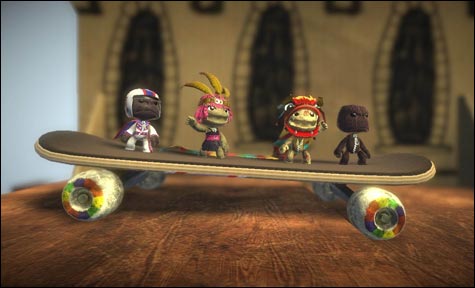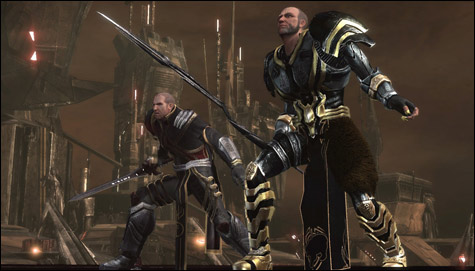 Above: There are places I remember / All my life, though some have changed / Some forever, not for better
Above: There are places I remember / All my life, though some have changed / Some forever, not for betterI've been playing Mega Man 9, and enjoying it -- mostly. But there's an unintended consequence of my playing this game: It's causing me to re-evaluate my relationship with Mega Man 2.
Along with Contra, Mega Man 2 is my favorite NES game. Both are considered among the most difficult 8-bit games, but I can beat each one without breaking a sweat. That's not thanks to any particular skill on my part. It's because I played these games until I knew every screen by heart. Playing them isn't a matter of reacting to what's happening onscreen. It's all muscle memory. I know every move my enemies make before they make it. I know what hazards will appear onscreen at each moment. I can leap with confidence to platforms that haven't even appeared yet. I can fire at the exact location my offscreen foes will be seconds from now.
I can tell you everything you need to know about Mega Man 2 more easily than I can remember my family members' birthdays. Beat Metal Man first, then use the Metal Blade to defeat Flash Man, Bubble Man, and Wood Man. The Wood Shield takes down Air Man, whose Air Shooter makes short work of Crash Man (hang onto those Crash Missiles; you'll need them in Dr. Wily's Castle). Use Flash Stop against Quick Man and Bubble Lead against Heat Man.
In Dr. Wily's castle, the Quick Boomerangs will dispatch both the flying dragon and the Gutsdozer with ease. Use Metal Blades to knock off the second stage boss, and Crash Missiles against the fourth stage boss (hot tip: to avoid getting hit by the converging fire from the latter boss, pause and un-pause the game as quickly as you can until the rounds have passed through you). To destroy Dr. Wily's ship, first use a charged Atomic Fire to blast away the hull, and then go at the cockpit with Metal Blades. To defeat the final boss, Bubble Lead is your way to go.
And, of course, if you want to skip straight to Dr. Wily's castle at start-up, the code is A1 B2 B4 C1 C5 D1 D3 E3 E5.
I say all this not because you need to know it -- you probably knew it already -- but to demonstrate how reflexive one's knowledge of an NES game had to be. For me, that was partly a result of simply playing the same games over and over for weeks or months at a time. But it's also what was required to beat these games. You had to know them inside out. They were littered with traps that would be unavoidable unless you already knew they were coming. Unless you could traverse the levels with your eyes closed, you couldn't do it at all. With minimal extra lives, and a frequent "game over" screen, getting through a Mega Man game was a matter of attrition.
This is still the case with Mega Man 9.
As others have noted, and as I will note in my review, Mega Man 9 is a perfect emulation of a Nintendo game. From the graphics, to the sound, to the level design, you could have told me this game was originally released in 1988 and I'd believe you. That's the argument in the game's favor. It's also a stark reminder of how games have changed since then -- for the better, I'd argue.
There is a feeling of accomplishment in getting through a tough game, sure. And the platforming challenges and boss battles I've encountered so far in Mega Man 9 aren't all that difficult from a purely mechanical standpoint. They just require a little planning and practice. (An early example: In Splash Woman's stage, you drop from one screen to the next. If you are not already pressing left or right on the d-pad when the screen scrolls, you will not have enough time to avoid hitting insta-kill spikes.) But this method of level design feels cheap to my 2008 self. Why shouldn't I be able to hang back and regroup? I've seen the "game over" screen more after three levels of Mega Man 9 than I did in the entirety of BioShock.
Still, my enjoyment of Mega Man 9 increased when I decided to hit up GameFaqs for the optimal stage order. For a minute I felt like I was cheating somehow, but then I realized: I never figured anything out in Mega Man 2 on my own. Not a thing. Not only was I told which weapon to use on what boss, I even watched my friend Ryan go through all the levels before I ever completed any of them myself.
There's the basic truth of this: In all my warm and fuzzy memories of Mega Man 2, I cannot remember a time when I didn't know all there was to know about it. That level of mastery colors my perception of the game, as it has for the past 20 years.
Now? I may be able to look up strategies to help me get through Mega Man 9, but after that I'll be done with it. This has to do with how games have changed, and how I've changed as a player. What this game has done is convince me that if I played Mega Man 2 for the first time today, I wouldn't like it very much. I can't imagine anything sadder.




